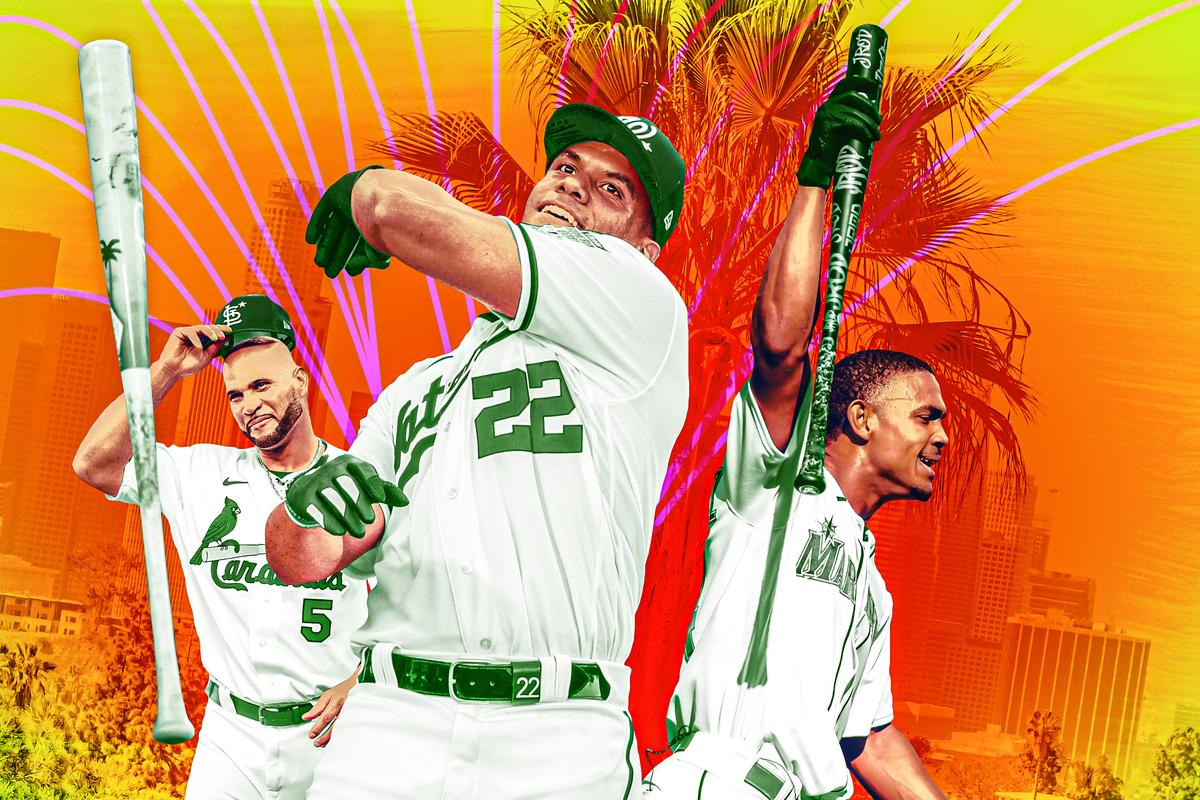
Albert Pujols walked onto the Dodger Stadium infield Monday as a faintly Abrahamic figure, flanked by children both biological and cultural. Despite playing only part time and having just six home runs this season, Pujols joined the Home Run Derby field by special invitation from MLB, as a capstone of sorts for the man who’s hit 180 more home runs than any other active player.
The valedictory tone of his appearance was obvious from the start. A throng of players surrounded Pujols to salute him near the end of his first round, when it looked like he would fall to no. 1 seed Kyle Schwarber. But Pujols unexpectedly bested the Phillies outfielder in a swing-off before losing in the semifinal to Juan Soto. (The 42-year-old Pujols seemed equal parts excited to win and aggrieved at having to stand up again; in this respect, the three-time MVP has never been more relatable.)
As the oldest of four Dominican players in the field, along with Soto, Julio Rodríguez, and José Ramírez, Pujols’s final moment in the sun wasn’t just a curtain call, but a passing of the torch. Minutes before the Derby, Pujols told ESPN’s Marly Rivera that he thought of Soto as a Hall of Famer in the making, a remark to which Soto expressed humbled gratitude, but one that could not have surprised anyone who’s seen Soto play. Sure enough, it was Soto who took home the trophy and the $1 million grand prize. And the 23-year-old who reminded anyone who might have forgotten of his singular star power—and worth.
On Saturday, the Nationals leaked the latest news on Soto’s contract extension negotiations: Their superstar outfielder had turned down a 15-year, $440 million offer, and as a result Washington will entertain trade offers for its franchise player.
During his media availability on Monday, Soto admitted that the leak had left him “uncomfortable” and unsure of whom to trust. As unthinkable as this would’ve seemed just a few days ago, Soto could be on the move as soon as the trade deadline.
Even with Pujols’s final curtain call and Soto’s professional watershed moment, though, it was Rodríguez who stole the show. The biggest pyrotechnics of the night came during introductions and startled the hell out of Ronald Acuña Jr., but the second-biggest came courtesy of Seattle’s center fielder.
The 21-year-old Mariner is in the middle of a stunning rookie season, hitting .275/.337/.477 with 16 home runs and 21 stolen bases. But outside of Seattle, he’s largely an unknown, at best a name on a fantasy roster—just the kind of young player who could use a platform like the Derby to launch himself to superstardom.
Rodríguez led off the opening round with 32 home runs to set up a memorable confrontation with Pete Alonso in the semis. The two-time reigning champ had put months of preparation into this moment. He had practiced, trained, manifested for an unprecedented third consecutive Home Run Derby title. Yet as Alonso prowled the bowels of Dodger Stadium, pausing to meditate here or to reengage his glutes there, Rodríguez was putting on a show.
Just one minute and 16 seconds into the round, Rodríguez called timeout. He not only looked uncomfortable, he had just seven dingers on the board, leaving him miles from safety with Alonso next to hit. But he quickly collected himself, cranking 24 more home runs in the final 2:44 of his second turn. Alonso, for all his bombast and winkingly self-serious preparation, was dead before he took his first swing. The Mets slugger hit more home runs than he had in any of his previous second-round appearances and still got his shoes knocked off by Rodríguez. The man himself, like Michael Jordan, could only lift his eyebrows and shrug.
The final round, then, pitted two young greats against each other: Rodríguez one more explosive round from an all-time-great Derby, Soto methodically surviving and advancing, prepared to hit the gas at the crucial moment. For Soto to get the win, he needed to close his turn on a hot streak, just as Rodríguez had done the round before. That and a bit of luck—MLB awards an extra 30 seconds’ worth of time to players who hit two home runs of 440 feet or longer in the round, which Soto did. Rodríguez, who’d cleared that bar with ease in the first round, hit home runs of 446, 439, and 437 feet in the final, and so was denied the extra time that ultimately made the difference. Rodríguez hit 81 home runs on the night, but it wasn’t enough.
Winning, of course, is not a prerequisite for a rookie who aims to steal the show at the Home Run Derby. Just ask another young Dominican superstar, Vladimir Guerrero Jr., who dominated the 2019 event before falling to Alonso at the final hurdle. Rodríguez not only gave Soto a run for his (literal) money, he provided an interesting stylistic contrast with the incumbent NL MVP runner-up. Soto used his bat control to spray mortar shots all over the Dodger Stadium seats, working foul pole to foul pole in a manner almost unheard of for a Derby champion. Rodríguez, meanwhile, peppered the area between the left-field line and the left-center power alley, cranking one line drive after another with metronomic precision.
Rodríguez, Soto, and Pujols brought to life the Sphinx’s famous riddle about the thing that walks with four legs in the morning, two at midday, and three at night. The sudden power of Rodríguez, the skill and savvy of Soto, and the serene sagacity of Pujols played out in one arc—or rather, between the three of them, the arcs of 169 home runs—with the baseball world watching.
Monday night, we didn’t just see baseball’s most exciting event. We saw the sport’s past, present, and future.